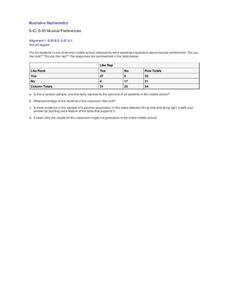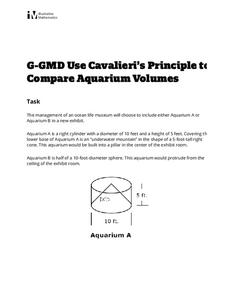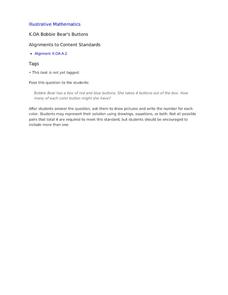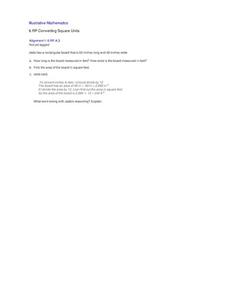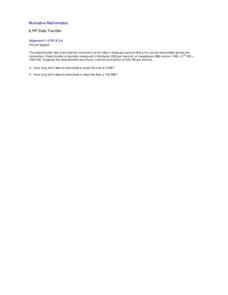Illustrative Mathematics
Should We Send Out a Certificate?
Fred thinks his test score is high enough to earn him a certificate. Given the mean and standard deviation, use properties of normal distributions to calculate Fred's percentile ranking and see if he is right. Consider having your class...
Illustrative Mathematics
Musical Preferences
If you like rap music, are you more likely to like rock music? Use statistical analysis to determine if there is a positive association between rap and rock in this particular sample. While the problem is relatively simple, the...
Illustrative Mathematics
Felicia's Drive
Learners consider several factors to determine if Felicia has enough gas to make it to her destination. They must explain the approximations Felicia might make while driving to determine if she needs to stop for gas. They are also asked...
Illustrative Mathematics
Crude Oil and Gas Mileage
Here is an activity that presents a real-world problem about the relationship between crude oil production and the gas mileage of modern automobiles. After learners write functions to describe the relationships, they are asked to...
Illustrative Mathematics
Invertible or Not?
What determines whether a function has an inverse? Learners investigate that criteria when they examine values in a partially completed input-output table for two different functions. The task is to complete the table so that one of the...
Illustrative Mathematics
Global Positioning System II
Intricate details of a modern technology that many of us take for granted in our phones, computers (and some cars) are laid bare in a short but deeply investigative activity. The math behind a seemingly simple GPS device...
Illustrative Mathematics
Slopes and Circles
An upper-level treatment of what is often presented as a basic concept (the right angle of an inscribed circle on the diameter), this activity really elevates the mathematical thought of the learner! Expected to develop formulas...
Illustrative Mathematics
Use Cavalieri’s Principle to Compare Aquarium Volumes
Learners are designing a stunning new water feature for an aquarium, but they soon discover that more than just a pretty home for their fishy friends is required. From calculating the volume of a composite shape through the...
Illustrative Mathematics
Tangent to a Circle From a Point
Learners see application of construction techniques in a short but sophisticated problem. Combining the properties of inscribed triangles with tangent lines and radii makes a nice bridge between units, a way of using...
Illustrative Mathematics
Adding Tenths and Hundredths
Learning to add fractions with different denominators presents a big hurdle for many young mathematicians. Simplify the process for learners with this series of practice problems involving the friendly fractions tenths and hundredths....
Illustrative Mathematics
Make 9
Learning how numbers are put together as parts and wholes is a big step in building the foundational number sense of young mathematicians. Here, children are given a number less than 10 and are asked to find as many pairs of numbers as...
Illustrative Mathematics
A Bobbie Bear's Buttons
Young mathematicians help Bobbie Bear pick colored buttons out of a box as they learn how to decompose numbers less than 10 into pairs of smaller numbers. To support students with the process, consider creating a worksheet or graphic...
Illustrative Mathematics
Shape Hunt Part 1
The hunt is on! Send young mathematicians on a search for shapes in the first lesson of this two-part series. Each time a child finds a hidden shape, he draws it on his paper, and continues searching for the rest. Perform this activity...
Illustrative Mathematics
Running at a Constant Speed
The learner must use the given constant speed to find the unit rate. A table is made in order to relate the speed to the time and the distance. From the table, learners are able to see the unit rate in miles per minute and miles per...
Illustrative Mathematics
Writing Expressions
Practice writing algebraic expressions from written phrases. The objective is to consider two seemingly similar phrases, write them as algebraic expressions, and then simplify using the order of operations. Learners are challenged to...
Illustrative Mathematics
Converting Square Units
Jada has a rectangle board that is measured in inches. Young learners confirm their understanding of converting inches to feet. Then they find the area in square feet. Jada thinks she has a short-cut to convert inches square to square...
Illustrative Mathematics
Data Transfer
A question to ask your class is, How fast is your Internet? That depends on the data transfer rate (DTR), which is the unit rate used in this activity. Math students will calculate how long it takes to download a music file and a video...
Illustrative Mathematics
Making Cookies
Hooray for chocolate chip cookies! Ask your mathematicians to triple a chocolate chip cookie recipe and then reduce the recipe by one-fourth. Your class may need two days to complete, tripling the recipe the first day and reducing the...
Illustrative Mathematics
Computing Volume Progression 3
Learners are given a volume of a rectangular tank and are asked to find the water height. Because the total volume of the tank is given in liters, your geometers will need to use a unit ratio to convert to centimeters cubed. The exercise...
Illustrative Mathematics
Kendall's Vase - Tax
Practice sales tax when using the activity with three solution choices. Learners can use a percent table, benchmark percent, or solve by calculating. Solutions don't show how to multiply by the decimal, but method can be added in....
Illustrative Mathematics
Floor Plan
A multi-step problem has learners finding the actual area based on a scale drawing and then converting units at the end. Two different solution choices are listed depending on the preference on which step to start first. Both methods can...
Illustrative Mathematics
Voting for Two, Variation 4
After elections, the total amount of votes is not specified but the ratio of votes is. Your learners' job is to determine the fraction of votes John received above half of all votes. The problem can be solved abstractly or by other...
Illustrative Mathematics
Voting for Two, Variation 3
After calculating election votes, your learners must determine how many votes the winner, John, got above 50%. This multi-step problem encourages them to think in a deeper way about what the question is asking them to find. Use with...
Illustrative Mathematics
Voting for Two, Variation 2
John won the election, but by how much more? Your learners will calculate how many votes each candidate received in order to determine the difference. Use with other lessons provided in the series to practice different variations of this...



